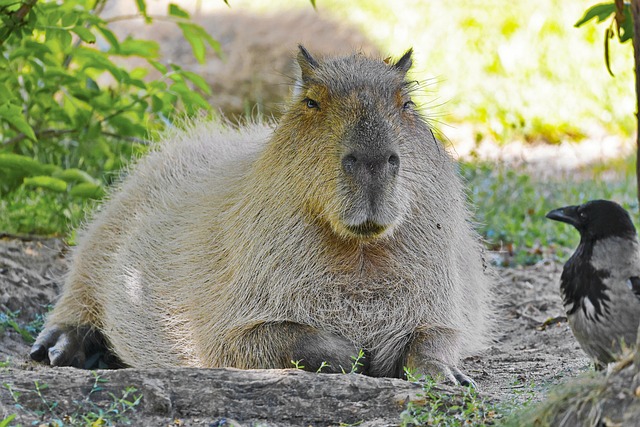Physical Address
304 North Cardinal St.
Dorchester Center, MA 02124

When we think of long-lived creatures in the animal kingdom, the first names that come to mind are often tortoises, elephants, and certain species of whales. Rarely does the capybara make this list, but perhaps it should. These large, herbivorous rodents native to South America have quietly been defying the odds of longevity for centuries. With an average lifespan of 8 to 10 years in the wild and up to 12 years in captivity, capybaras are among the most long-lived rodents on the planet. What is the secret behind their remarkable longevity? In this article, we will dive into the fascinating world of capybaras to uncover the factors contributing to their extended lifespans.
Table of Contents
ToggleBefore we dive into the secrets of capybara longevity, it’s essential to understand what makes these creatures unique and why they deserve our attention. Capybaras (Hydrochoerus hydrochaeris) are the largest rodents in the world, with some individuals reaching lengths of up to 4 feet and weighing as much as 150 pounds. Resembling oversized guinea pigs, they have a friendly, amiable appearance, which has earned them the nickname “nature’s gentle giants.”
Capybaras are semi-aquatic animals, primarily found in South American countries like Brazil, Venezuela, Colombia, and Argentina. They inhabit a variety of habitats, including grasslands, savannas, and wetlands, often close to water sources like rivers and lakes. Their webbed feet and dense fur make them excellent swimmers and allow them to easily navigate through their aquatic environments.
Capybaras are highly social creatures, forming tight-knit groups known as “capybara clans.” These clans, consisting of several adults and their offspring, offer protection and companionship. Interestingly, they are also known to form mutually beneficial relationships with other species like birds, who help keep them free of parasites, and sometimes even caimans, with whom they share basking spots.
The capybara’s lifespan, particularly in captivity, has long been a subject of fascination for researchers and animal enthusiasts alike. To comprehend the secret behind their longevity, we need to explore various factors that contribute to their extended lifespan.
One of the primary reasons behind the capybara’s longevity is its herbivorous diet. Capybaras are strict vegetarians, primarily feeding on grasses, aquatic plants, and occasionally tree bark and fruit. This diet is high in fiber and low in fat, which can be linked to their overall health and longevity.
The herbivorous diet provides several advantages. It reduces the risk of obesity and related health issues, such as heart disease and diabetes, which are prevalent in animals with high-fat diets. Additionally, their diet is less likely to expose them to toxins and contaminants commonly found in the flesh of prey animals. This plant-based diet ensures that capybaras avoid many of the health problems associated with carnivorous or omnivorous diets.
Capybaras possess an efficient digestive system that allows them to extract maximum nutrients from their plant-based diet. Their large, complex cecum serves as a fermentation chamber where bacteria break down tough plant material. This fermentation process not only helps them extract nutrients but also enables them to digest cellulose, a complex carbohydrate that many other animals cannot break down. This unique digestive system aids in extracting vital nutrients from their fibrous diet, contributing to their overall health and longevity.
Capybaras have earned their reputation as nature’s easy-going creatures. They are known for their tranquil and social nature, which plays a crucial role in reducing stress levels. In the wild, they live in close-knit groups, offering social support and protection from potential predators. In captivity, they often form strong bonds with their human caregivers or other animals, further reducing stress.
Stress has been linked to various health problems in animals, just as it is in humans. Chronic stress can weaken the immune system, increase the risk of diseases, and accelerate the aging process. Capybaras’ relaxed and social lifestyle may be a significant factor in their ability to lead long and healthy lives.
In their native habitats, capybaras have relatively few natural predators. While they are not entirely immune to predation, being at the top of the food chain within their ecosystems, they face fewer threats than smaller animals. This lower predation risk contributes to their extended lifespans.
Capybaras are highly adaptable animals, which allows them to thrive in various environments and under changing conditions. This adaptability extends to their behavior, enabling them to adjust their daily routines and activities as needed. For example, they are crepuscular, meaning they are most active during dawn and dusk when temperatures are cooler. This behavior helps them conserve energy and avoid extreme heat, reducing stress on their bodies.
Capybaras are excellent parents, and their nurturing behavior can also contribute to the longevity of their offspring. Female capybaras invest a significant amount of time and effort in caring for their young, nursing them for several months and providing protection within the clan. This maternal care increases the chances of survival for the young capybaras, ensuring the continuation of their genetic line.
While the factors mentioned above contribute to the natural longevity of capybaras, the role of captivity should not be underestimated. Capybaras in captivity tend to live longer than their wild counterparts, often reaching up to 12 years or more. This extended lifespan in captivity can be attributed to several key factors:
In captivity, capybaras are provided with a controlled and consistent diet, ensuring they receive all necessary nutrients. Unlike in the wild, where they may face periods of food scarcity or consume potentially harmful plants, captive capybaras have access to a balanced diet that supports their health and longevity.
Captive capybaras typically receive regular veterinary care, including vaccinations, dental check-ups, and treatments for any health issues that may arise. This level of medical attention helps prevent and address health problems, contributing to their extended lifespan.
In captivity, capybaras are protected from natural predators, eliminating one of the primary threats to their survival. This increased safety allows them to live longer and healthier lives.
Captivity provides a controlled and stable environment, reducing the stressors that capybaras may encounter in the wild. Factors such as extreme weather conditions, habitat loss, and competition for resources are minimized in captivity, promoting a lower-stress lifestyle.
Capybaras are highly social animals, and captivity often allows for consistent social interaction with other capybaras or even other species. These social bonds can contribute to reduced stress and a higher quality of life, positively impacting their overall health and longevity.
While captivity can extend the lifespan of capybaras and provide valuable insights into their biology, it’s essential to approach captivity with care and ethical considerations. Captive breeding and research programs must prioritize the welfare of these animals, ensuring they are provided with appropriate living conditions, social interaction, and medical care.
Conservation efforts should also focus on preserving the capybara’s natural habitat and protecting these creatures in the wild. Deforestation, habitat destruction, and illegal hunting are significant threats to their populations, and addressing these issues is crucial for their long-term survival.
Capybaras, the gentle giants of the animal kingdom, have much to teach us about longevity and well-being. Their herbivorous diet, efficient digestive system, low-stress lifestyle, and other unique traits all contribute to their remarkable lifespan. In captivity, these factors are further enhanced, allowing them to live even longer, healthier lives.
As we continue to study and appreciate these remarkable creatures, we gain valuable insights into the secrets of longevity. Moreover, we are reminded of the importance of preserving their natural habitats and ensuring their welfare in captivity. Capybaras serve as a reminder that by understanding and respecting the needs of animals, we can not only unlock the secrets of their longevity but also contribute to their conservation and well-being for generations to come.
Hi, I'm Ralph. I've dedicated part of my life to studying and writing about rodents. My work spans their behavior, biology, habitats, and conservation. On this site, I share my expertise to educate and inspire fellow rodent enthusiasts. Whether you're a pet owner seeking care tips or a wildlife lover exploring your backyard's fauna, you'll find valuable resources here.



